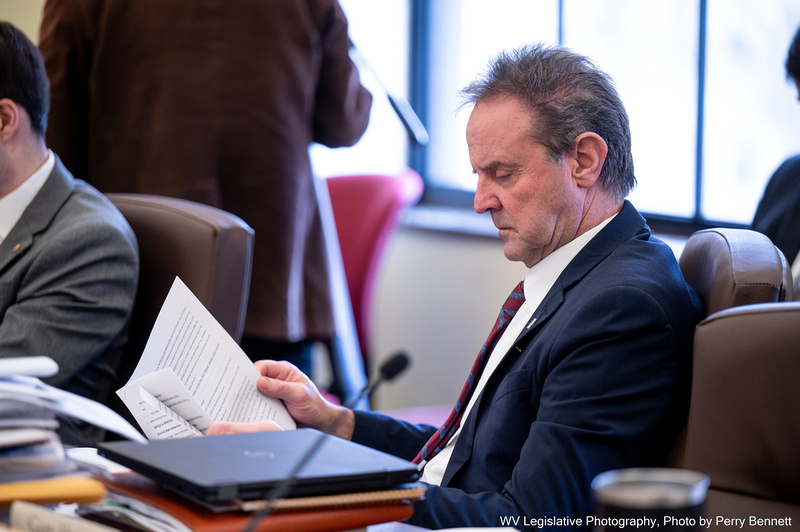Del. Dana Ferrell, R-Kanawha: ‘Sometimes the government has to move in for the safety and well-being of children. And this, I think, is one of those cases.’
BY: CAITY COYNE
Following a narrow vote by the House Committee on Finance, the full House of Delegates will soon consider, for the first time in 10 years, a bill that would prohibit smoking in cars with children under the age of 16.
Senate Bill 378 passed House Finance on a 9-7 vote on Monday. The bill has already been approved by the Senate, and will now advance to the full House for consideration.
If enacted, the proposed law would levy a $25 fine to adults found smoking in cars with children under 16 only when they are already being cited for other traffic violations.
Different versions of SB 378 have been introduced in both chambers of the Legislature since at least 2014. This is the closest any of those bills has ever come to passage.
During committee on Monday morning, Del. John Hardy, R-Berkeley, was the only member to voice discontent with the legislation, citing concerns about “big government” and “the establishment.”
“I think that this is just another big government bill. An establishment bill. Now we’re saying [no smoking with kids] in your vehicle, well the next step is your home. The next step may be your business. Where are we moving this to?” Hardy said during the meeting. “So, this is the most un-Republican bill that I’ve ever seen in my life.”
The Clean Indoor Air Act already prohibits smoking in most businesses in West Virginia.
Hardy’s comments echo those of Sen. Mike Azinger, R-Wood, who — along with several members of the newly formed Freedom Caucus — voted against the bill in the Senate earlier this session due to concerns about infringing on parental rights and personal liberties.
Exposure to secondhand smoke is especially dangerous for children and, generally, linked to increased rates of lung cancer and other pulmonary diseases later in life, even for people who don’t smoke. Per the Centers for Disease Control and Prevention, secondhand smoke contributes to about 41,000 deaths among nonsmoking adults and 400 deaths in infants nationwide annually.
“We’re always concerned about big government, its interference in our personal lives,” said Del. Dana Ferrell, R-Kanawha. “In this case, here you have a child being in the vehicle that has no say and they’re put in a captured environment, in — what many would say, I think most medical doctors — toxic smoke, and it’s in that vehicle that they can’t escape.”
Ferrell continued, sharing his experiences growing up when his parents would smoke in the car and he and his siblings would try to hide their heads near the floorboards to avoid the smoke.
“[S]ometimes the government has to move in for the safety and well-being of children. And this, I think, is one of those cases,” Ferrell said. “It may seem trite to some but I’ve been there, I’ve experienced that. It’s a horrible situation I wouldn’t wish on any other child.”
Dels. Margitta Mazzocchi, R-Logan and Larry Rowe, D-Kanawha, also voiced support for the bill during committee. Rowe said he believed a crucial part of the legislation is the message it sends about the dangers of tobacco and nicotine use and exposure to secondhand smoke.
According to the CDC, babies exposed to secondhand smoke are more likely to suffer from sudden infant death syndrome, which is the leading cause of death for otherwise healthy infants in America. Respiratory illnesses, asthma and impaired lung function — which can be lifelong — affect children exposed to secondhand smoke at higher rates than other kids, with the potential harm increased with more exposure over time.
Rates for exposure to secondhand smoke have been on the decline for everyone in the United States over the past 20 years thanks to policies like clean indoor air acts and a general decrease in the number of people who smoke cigarettes. Exposure rates for people who live below the poverty line, however, are about 50% higher than for other classes.
In West Virginia, nearly a quarter of residents report using tobacco — the highest rate in the nation, per the CDC — and lung cancer diagnosis rates outpace that of every other state. The Mountain State also reports the highest rate of smoking-related deaths per capita nationwide.
** West Virginia Watch is a nonprofit media source. Articles are shared under creative commons license. Please visit https://westvirginiawatch.com/ for more independent Mountain State news coverage.

